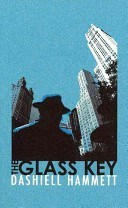Reading Matters: Hammett’s ‘The Glass Key’
Partly as an antidote to the prolixity of Dickens’ Bleak House, which I’m engaged in re-reading, I’ve also been reading again Dashiell Hammett’s 1931 novel, The Glass Key. This was put into my mind by David Peace’s sparky and persuasive little essay in Connolly & Burke’s Books to Die For [" … the book every person should read at least once, and every writer at least once a month, is The Glass Key."] And lo and behold, no sooner had I read that, than I spotted on the crime fiction shelf in the Charing Cross Road Foyles, the particularly attractive set of Orion paperback reissues of all five Hammett novels.
One thing that struck me early on was the extent to which Dickens and Hammett share a belief that the many facets of the world – initial appearances to the contrary – are inextricably intertwined; a belief also in the extent to which some will go to further their own ends at the expense of others. For all that Dickens was a prolific workaholic and Hammett, after his first flush, found writing almost the hardest thing imaginable, both are, it seems to me, natural story tellers and in the stories that they tell they are concerned to reveal what underlies them, what makes their worlds work. Dickens is keen here to show the iniquities and inhumanity of the law, the miserable conditions of the poor; Hammett wants us to see that politicians – all politicians – are venal and corrupt.
What they do not share is the quality Dickens can at times be said to possess in excess – that of sentimentality. I doubt that Hammett had a sentimental bone in his TB-wracked body. There can be loyalty – up t0 a point – but that’s as far as it goes.
Raymond Chandler said of Hammett, Peace reminds us, that he “was spare, frugal, hard-boiled, but he did over and over again what only the best writers can ever do at all. He wrote scenes that seemed never to have been written before.”
Chandler could be sentimental, too. And much as he admired the hard edged frugality of Hammett’s style, he himself softened it and made it more palatable with wit and humour and exaggerated metaphor, sentences that seemed sometimes to owe as much to the Latinate education he would have received at Dulwich College as they did to the pages of Black Mask. And if his hero was a modern knight whose shining armour was only partly shielded by his raincoat and trilby hat, Hammett’s heroes owed more to the morally ambivalent characters of Jacobean drama, playing both sides against the middle and much possessed of death.
When Philip Marlowe is sapped from behind he usually falls into a convenient pool of darkness at the chapter’s end. When Ned Beaumont, in The Glass Key, is punched full in the face with a fist, again and again, Hammett is concerned that we share the pain.
Ned Beaumont mumbled something about Fedink and sat up. He was in a narrow bed without sheets or bedclothes of any sort. The bare mattress was blood-stained. His face was swollen and bruised and blood-smeared. Dried blood glued his shirt-sleeve to the wrist the dog had bitten and the hand was caked with drying blood. He was in a small yellow and white bedroom furnished with two chairs, a table, a chest of drawers, a wall-mirror, and three white-framed French prints, besides the bed. Facing the foot of the bed was a door that stood open to show part of the interior of a white-tiled bathroom. There was another door, shut. There were no windows.






